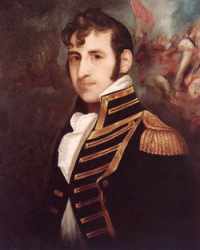
 |
|
|
||
|
Stephen Decatur |
||||
|
Engagements: • Quasi-War (Franco-American War) (1798 - 1800)• War of 1812 |
||||
| Biography: | ||||
|
Stephen Decatur Stephen Decatur was born on 5 January 1779 in Sinnepuxent, MD, to Stephen and Ann Pine Decatur. He attended the Episcopal Academy and then the University of Pennsylvania. Military Service Decatur was appointed a Midshipman in the U.S. Navy in April 1798 and served on the USS United States during the so-called quasi-war with France from 1798 to 1800. In 1803, he was given command of the brig, USS Argus, and sailed to the Mediterranean for service in the First Barbary War. He was lauded for conspicuous gallantry in the recapture of the USS Philadelphia from the Tripolitans, and bombardment of the city. He became a national hero and was promoted to Captain. After the events of the Chesapeake-Leopard Affair in 1807, Commodore James Barron was brought before a court martial upon which Decatur served. He found against Barron, who lost his rank and position, and exiled himself to Europe. During the War of 1812, Decatur commanded the USS United States. Sailing to the Azores in heavy seas, he engaged the British frigate, Macedonian, and bombed her into a hulk from long range. Macedonian surrendered and was taken as a prize. In the spring of 1814, he commanded the USS President and a squadron of three vessels in the West Indies, where he encountered the British West Indies Squadron comprised of four ships. During the ensuing battle, the USS President was run aground, and took two broadsides. Decatur was forced to surrender and was made prisoner. After peace with Great Britain, he commanded the U.S. Mediterranean Squadron in the Second Barbary War. In a pioneering display of Gunboat Diplomacy, he put an end to the practice of paying tribute to pirate states, and secured the final peace treaty with the Barbary Powers. From 1816-20, he served as a Navy Commissioner in Washington, DC. Following the war, James Barron returned to the U.S. and attempted to re-enlist, Decatur made it known that he did not feel Barron deserved to return to the Navy. In 1819, Barron accused Decatur of maligning his name and maliciously destroying his career. He challenged Decatur to a duel, and the two men exchanged shots at Bladensburg Dueling Field in Bladensburg, MD (present day Colmar Manor, MD), on 22 March 1820. Decatur inflicted a severe wound and was himself mortally wounded through the abdomen. He was taken home, and after some twelve hours of agony, died. He was forty-one years old. There was no official response to his death; no charges were pressed. Honors •Five U.S. Navy ships have been named USS Decatur in his honor. •Forty-six American communities, and numerous schools and highways have also been named in his honor. Death and Burial Stephen Decatur died on 22 March 1820. He is buried at Saint Peter's Episcopal Churchyard in Philadelphia, PA. Decatur's funeral was attended by officers of the U.S. Navy and Marine Corps, President James Monroe, former President James Madison, the Cabinet, members of the Senate, House, Supreme Court, and more than 10,000 others who wished to pay respects to a national hero. http://www.findagrave.com/cgi-bin/fg.cgi?page=gr |
||||
| Honoree ID: 2418 | Created by: MHOH | |||
Ribbons
Medals
Badges
Honoree Photos
 |  |  |
 |  |
 |


